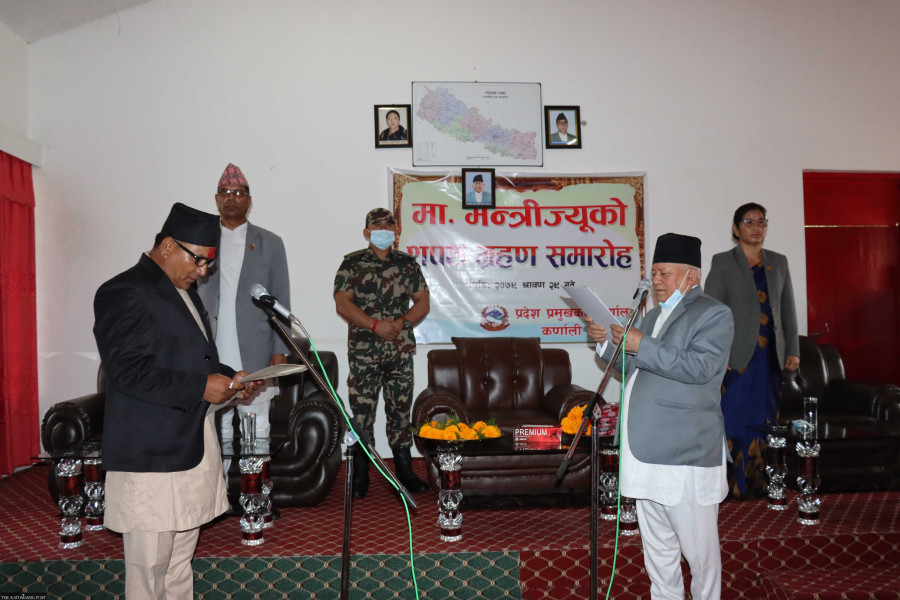National
Questions of inclusivity arise over Sunday’s Karnali Cabinet reshuffle
There are eight members in the Cabinet—all men from the Khas-Arya community.
Jyotee Katuwal
Chief Minister of Karnali Province Jiban Bahadur Shahi on Sunday reshuffled the provincial Council of Ministers. The move, however, goes against the spirit of Nepal’s constitution as all the eight new members in the Cabinet are men from the Khas Arya communities.
The Council of Ministers does not have the representation of women, Dalit, Janjati and Madhesi as mentioned in the constitution.
The Constitution of Nepal allows a provincial council of ministers to have up to 20 percent of the total provincial assembly members. Article 168 (9) of the statute says the chief of the province shall, on the chief minister’s recommendation, constitute the Provincial Council of Ministers consisting of a maximum 20 percent of the total number of assembly members, including the chief minister, in accordance with the principle of inclusion, from amongst the assembly members.
The Council of Ministers of Karnali has been without a female minister since the appointment of non-parliamentarian Karchen Lama for the ministerial berth six months ago. A writ petition was filed at the Surkhet High Court upon his appointment stating that it clearly violated the principle of inclusiveness mentioned in the constitution. But the Karnali provincial government claimed that the Cabinet was inclusive as minister Lama was from the Janjati community.
The CPN (Maoist Centre) recommended appointing Bir Bahadur Shahi of Dolpa district as a minister after Lama’s term ended on August 8. The high court on Friday drew the attention of the provincial government urging it to respect the constitutional provision of inclusiveness while forming the Council of Ministers. In a letter issued by the court, the provincial chief and the chief minister were requested to execute their constitutional roles to make the Cabinet inclusive as per the spirit of the constitution.
But two days after the court drew the government’s attention, Provincial Chief Tilak Pariyar administered the oath of office and secrecy to the ministers of the Cabinet.
“The political parties ignored legal and constitutional provisions while forming the Cabinet,” said Debi Oli, the chairperson of the Social Development Committee of Karnali Province. “Where is the representation of women in the Council of Ministers?”
Oli lambasted the political parties for not recommending even a single female member while reshuffling the Cabinet four times in recent times.
The female lawmakers have expressed their concerns about lack of women representation in the Council of Ministers. “Patriarchy is alive in Karnali Province. The leaders deceive females by encroaching the policy and principle of the party,” said a female provincial assembly member preferring anonymity.
Karnali is the largest and remotest province among seven provinces in the country. A sizable number of Dalit population reside in the province. As per the preliminary report of the National Census of 2021, around 23 percent population in Karnali is from the Dalit community. Currently, only five members represent the Dalit community in the 40-member provincial assembly. There is no representation of the Dalit community in the Council of Ministers.
Constitution experts raised serious questions to the Karnali province government regarding inclusiveness. Tikaram Bhattarai, a constitution expert, termed the recently formed Council of Ministers in Karnali as ‘unconstitutional’.
“The Council of Ministers should be constituted as per the spirit of the constitution. The government itself is violating the constitution,” Bhattarai said. “It is a misfortune to form the Council of Ministers by violating the constitution.”
Dhruba Kumar Shrestha, chief attorney of Karnali Province, refused to make a comment about the issue. However, Chief Minister Shahi defended his move saying the appointments have adhered to geographical inclusiveness.




 8.22°C Kathmandu
8.22°C Kathmandu














